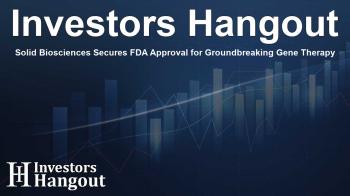Solid Biosciences Secures FDA Approval for Groundbreaking Gene Therapy

Solid Biosciences Breaks New Ground with SGT-501
Solid Biosciences Inc. is thrilled to announce a pivotal moment in cardiac care. The company has received Investigational New Drug (IND) approval from the U.S. Food and Drug Administration (FDA) and Clinical Trial Application (CTA) approval from Health Canada for SGT-501. This innovative gene therapy aims to combat catecholaminergic polymorphic ventricular tachycardia (CPVT), a serious condition marked by life-threatening heart arrhythmias.
The Importance of SGT-501
SGT-501 represents a significant breakthrough for patients suffering from this potentially fatal genetic cardiac disease, which has historically had no approved treatments. CPVT can lead to dangerous heart rhythms and complications that may result in fainting, seizures, or even sudden death. The gene therapy developed by Solid Biosciences is aimed specifically at mitigating these risks by targeting the underlying genetic issues associated with the condition.
Clinical Trial Insights
As the company prepares to initiate a Phase 1b clinical trial in the near future, anticipation within both the medical community and among patients is palpable. The trial will evaluate not only the safety and tolerability of SGT-501 but also its efficacy in real-world conditions. The upcoming clinical trial signifies a necessary and urgent step toward improving quality of life for those affected by CPVT, allowing for the exploration of treatment options that currently do not exist.
Understanding Catecholaminergic Polymorphic Ventricular Tachycardia
CPVT is characterized by abnormal heart rhythms, specifically during periods of exercise or emotional stress. This disorder usually presents in children and young adults, often leading to misdiagnosis due to its complex nature and symptoms. The root cause lies in specific mutations in the RYR2 and CASQ2 genes, which result in improper calcium regulation within heart muscle cells, impairing normal contraction and relaxation processes.
The Gene Therapy Mechanism
SGT-501 is based on an adeno-associated virus (AAV) technology designed to deliver a functional copy of the human cardiac calsequestrin (CASQ2) gene. This therapy aims to enhance calcium buffering in heart muscle cells, ultimately stabilizing the ryanodine receptor (RYR2). By promoting this stability, the therapy has the potential to significantly enhance cardiac rhythm regulation and protect against the risks posed by CPVT.
Collaboration with Leading Experts
The development of SGT-501 is the result of extensive collaboration with world-renowned experts, including Dr. Silvia Priori from the IRCCS Maugeri in Italy. Her groundbreaking work demonstrated that increasing levels of calsequestrin can offer therapeutic benefits, building a strong foundation for SGT-501’s development. This partnership highlights Solid Biosciences' commitment to combining innovative scientific research with patient-centered care.
Commitment to Patient-Centric Solutions
The mission of Solid Biosciences is deeply rooted in patient advocacy and care. By focusing on gene therapies for rare diseases like Duchenne muscular dystrophy and now CPVT, the company aims to provide hope and tangible solutions to those who desperately need them. Their dedication to this cause underscores not only their scientific prowess but also their compassion for patients impacted by debilitating health conditions.
About Solid Biosciences
Founded with a vision of creating transformative therapies, Solid Biosciences Inc. is dedicated to the development of precision genetic medicines. Their innovative approach aims to address the significant unmet needs within the realm of neuromuscular and cardiac diseases. The company is actively advancing its pipeline, including SGT-501 and targeting various genetic diseases, while fostering collaborations that emphasize breakthroughs in science and patient care.
Frequently Asked Questions
What is SGT-501?
SGT-501 is a gene therapy developed by Solid Biosciences to treat catecholaminergic polymorphic ventricular tachycardia (CPVT) by correcting the underlying genetic issues associated with the disease.
How does SGT-501 work?
It uses an AAV-based mechanism to deliver a functional copy of the CASQ2 gene, aiming to stabilize calcium regulation in heart muscle cells, which is crucial for maintaining a normal heartbeat.
What is CPVT?
Catecholaminergic polymorphic ventricular tachycardia is a condition that causes abnormal heart rhythms, primarily triggered by physical exertion or intense emotions, potentially leading to serious health risks.
Why is SGT-501 significant?
This therapy provides a novel approach to treat CPVT, addressing a critical lack of available treatments for this genetic cardiac disorder.
When will the clinical trials for SGT-501 begin?
The Phase 1b clinical trial for SGT-501 is expected to start in the near future, as Solid Biosciences prepares to evaluate its safety and efficacy.
About The Author
Contact Dominic Sanders privately here. Or send an email with ATTN: Dominic Sanders as the subject to contact@investorshangout.com.
About Investors Hangout
Investors Hangout is a leading online stock forum for financial discussion and learning, offering a wide range of free tools and resources. It draws in traders of all levels, who exchange market knowledge, investigate trading tactics, and keep an eye on industry developments in real time. Featuring financial articles, stock message boards, quotes, charts, company profiles, and live news updates. Through cooperative learning and a wealth of informational resources, it helps users from novices creating their first portfolios to experts honing their techniques. Join Investors Hangout today: https://investorshangout.com/
The content of this article is based on factual, publicly available information and does not represent legal, financial, or investment advice. Investors Hangout does not offer financial advice, and the author is not a licensed financial advisor. Consult a qualified advisor before making any financial or investment decisions based on this article. This article should not be considered advice to purchase, sell, or hold any securities or other investments. If any of the material provided here is inaccurate, please contact us for corrections.

